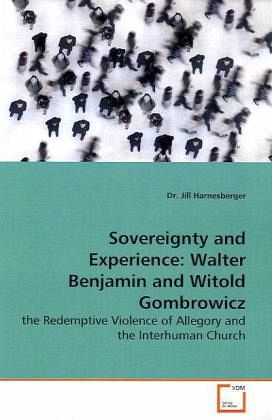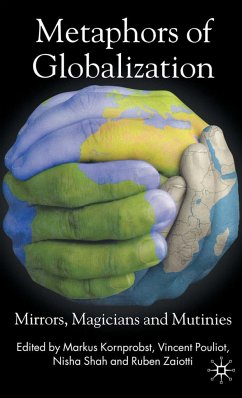
Sovereignty and Experience: Walter Benjamin and Witold Gombrowicz
the Redemptive Violence of Allegory and the Interhuman Church
Versandkostenfrei!
Versandfertig in 6-10 Tagen
45,99 €
inkl. MwSt.

PAYBACK Punkte
23 °P sammeln!
By dismantling misconceptions about experience, allegory, and storytelling, my book on Walter Benjamin and Witold Gombrowicz reveals that in the decline of the storyteller the allegorist is the new storyteller. Consequently, the preconceived notions that separate storytelling from allegory should be diminished. The allegorist, whose acts of redemptive rescue forge constellations between elements of the past unknown and unexperienced by anyone in the present, finds common ground with the storyteller through a necessary violence, Benjamin's model of allegory - the angel of history.Benjamin's Tra...
By dismantling misconceptions about experience,
allegory, and storytelling, my book on Walter
Benjamin and Witold Gombrowicz reveals that in the
decline of the storyteller the allegorist is the new
storyteller. Consequently, the preconceived notions
that separate storytelling from allegory should be
diminished. The allegorist, whose acts of
redemptive rescue forge constellations between
elements of the past unknown and unexperienced by
anyone in the present, finds common ground with
the storyteller through a necessary violence,
Benjamin's model of allegory - the angel of history.
Benjamin's Trauerspiel and Baudelaire studies create
a redemptive model for experience - allegory.
Moreover, allegory's role in salvaging experience
finds its counterpart in another violent model of
interruption: Witold Gombrowicz's interhuman
church. What allegory salvages in history and
inexperience, the interhuman church forms amidst the
ruins of language: the inauthentic "sovereign" self.
allegory, and storytelling, my book on Walter
Benjamin and Witold Gombrowicz reveals that in the
decline of the storyteller the allegorist is the new
storyteller. Consequently, the preconceived notions
that separate storytelling from allegory should be
diminished. The allegorist, whose acts of
redemptive rescue forge constellations between
elements of the past unknown and unexperienced by
anyone in the present, finds common ground with
the storyteller through a necessary violence,
Benjamin's model of allegory - the angel of history.
Benjamin's Trauerspiel and Baudelaire studies create
a redemptive model for experience - allegory.
Moreover, allegory's role in salvaging experience
finds its counterpart in another violent model of
interruption: Witold Gombrowicz's interhuman
church. What allegory salvages in history and
inexperience, the interhuman church forms amidst the
ruins of language: the inauthentic "sovereign" self.












